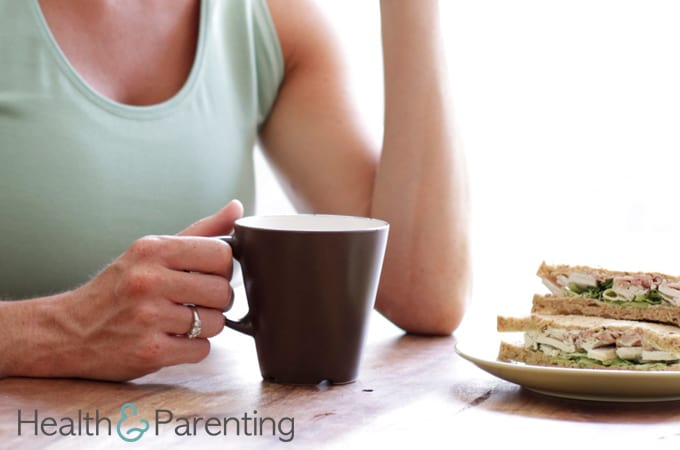Craving chocolate? You are advised to limit your daily consumption to 200mg of caffeine during pregnancy. This should include all of the caffeine in your diet, not just the cups of coffee. On average, the caffeine contents of popular dietary sources are as follows:
- 1 instant coffee – 100mg
- 1 filter coffee – 140 mg
- 1 tea – 75mg
- 1 green tea – 50 mg
- 1 can of cola – 40 mg
- 50g milk chocolate – 25mg
Risks of caffeine during pregnancy
Caffeine travels across the placenta and can affect your baby. If you exceed the recommended 200mg of caffeine each day, you will have an increased risk of miscarriage and low birth weight.
Giving up caffeine during pregnancy
Some women choose to cut caffeine out entirely for the duration of the pregnancy. If you’d like to cut out the caffeine, try the following tips to help you give up the hard stuff:
- Switch to water – instead of supping a soda during your lunch break, opt for a glass of water instead. Pregnant women are advised to drink eight glasses of water a day, you can achieve this by switching from caffeine drinks to good old fashioned water. Try adding a slice of lemon for flavour.
- Cut out chocolate – chocolate cookies, chocolate ice-cream and chocolate bars all contain caffeine. Give up chocolate, and replace it with a healthy snack such as fresh fruit or mixed nuts.
- Go herbal – give up your life-long tea and coffee addiction, and instead embrace life as an appreciator of herbal teas. Choose a herbal tea that is recommended during pregnancy (not all are), and have this as your new morning call.
- Get enough rest – if you get enough sleep at night, you won’t need to rely on caffeine to prise open your sleepy eyes in the morning. Sleep whenever you feel tired, and trust your body to tell you when it needs more rest.
- Expect withdrawal symptoms – for the first week of your new caffeine-free life, you may encounter a few symptoms. From headaches to mood swings, giving up caffeine can take its toll on your body. Caffeine is addictive, so expect the first week to be rough. Once that’s over, however, you should feel great.
- Stay motivated – when faced with the withdrawal headaches, it can be hard to stay motivated. You may feel like running to the nearest coffee shop and ordering a double espresso, but don’t. Stay strong, stay motivated, and you’ll be over the worst of the symptoms in no time. Keep a scan photo, or a list of reasons why you’re quitting, with you to remind you why you’ve embarked on this challenge.
Do you have any tips for battling caffeine withdrawal during pregnancy?
Written by Fiona, proud owner of a toddler, @fiona_peacock
This information is not intended to replace the advice of a trained medical doctor. Health & Parenting Ltd disclaims any liability for the decisions you make based on this information, which is provided to you on a general information basis only and not as a substitute for personalized medical advice. All contents copyright © Health & Parenting Ltd 2018. All rights reserved.










